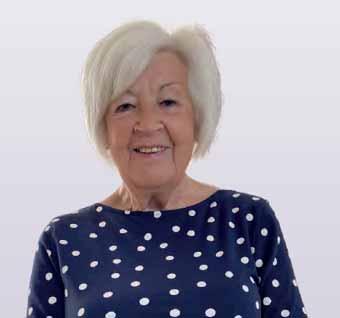
3 minute read
EXPLAINED Lord was gently persistent’
Recruiting Sergeant Mary Howie (Hamilton) shares

Soldiership
CSM /
AROUND the Army world there are 154,959 local officers supporting and upholding their corps and their leaders.
Similar to lay leaders in other denominations, they are soldiers who are commissioned to undertake specific duties. These include such roles as corps secretary, corps treasurer and recruiting sergeant. One of the most commonly mentioned is corps sergeant-major (CSM).
The Salvation Army Year Book 2022 defines a CSM as ‘the chief local officer for public work who assists the corps officer with meetings and usually takes command in their absence’. As such, Orders and Regulations for Local Officers says they are expected to be reliable, of ‘good sense’ and retain a measure of ‘godliness, devotion and loyalty’.
The main responsibility of the CSM is the everyday practical running of the corps and to help the corps officer/s with meetings. This traditionally includes arranging timetables for open-air meetings, along with marching arrangements and ensuring that equipment is available and in working order. The CSM is also responsible for recording meeting attendances and reporting these to the corps secretary, where there is one.
They generally arrange for the welcoming of people to indoor meetings and ensure that there are enough songbooks and Bibles available. These tasks are often delegated to a team of other corps members.
Finally, the CSM takes part in corps council and pastoral care council meetings, speaking into decisions and exercising pastoral care towards the fellowship.
If required, an assistant CSM can be appointed to help them with these duties.
Could God be calling you to local leadership?
Speak to your corps officer or read more at salvationist.org.uk/localofficership-and-service.
AS a very young child, I was taken along to The Salvation Army by my mother. I attended primary Sunday school and juniors. While in the juniors, I had a beautiful Christian company guard, who led me to the penitent form (mercy seat) on a ‘Decision Sunday’. I felt I wanted to give my heart to Jesus. This was the start of my Christian journey and that memory is still vivid to this day.
I became involved in many activities for young people, including corps cadets, youth councils and music camps, making friends with people I am still in contact with today across the UK and abroad.
I became a senior soldier in my teens and was aware that God had a plan for my life. This led me to undertake leadership roles, first within the BP sections then as corps cadet guardian, followed by YPSM. I was very privileged in these undertakings, helping young people in their Bible studies and developing their spiritual awareness. What a thrill it was to see many of these young people taking on responsibilities and leadership roles within the corps at a later date.
decision-making process, the Lord was gently persistent with me. Eventually I had to trust his leadings and pray that he would give me the wisdom and knowledge required for this task.
That was 30 years ago and today I am still undertaking this role. I have been so privileged to help individuals make decisions to become soldiers and adherents and been privy to some shared personal experiences.
I am now retired from employment but had a career in social work for more than 30 years. When I was studying for my degree, I was surprised to discover that on the essential leading list was William Booth’s book In Darkest England and the Way Out. Throughout the course we were reminded of the principles and values of social work, which included acceptance, empathy, being non-judgemental and believing that every human being has innate worth. It became clear to me that I could link my faith and my work principles, because Jesus had instructed his disciples to treat people with the same understanding and compassion.
he UK this ed th officer, me that be used ately as eant, a was unfilled his I was a h that
At a later date I was appointed corps secretary, a role that required my administration skills. During this period, we had a visit from the then chief secretary for the UK. During this visit we explored spiritual gifts and discipling. Following conversations and discussions with him and the corps officer, it was put to me that my gifts could be used more appropriately as recruiting sergeant, a position that was unfilled at that time. This I felt was a big ask and a huge challenge, one that required much prayer and contemplation.
During my of my Christian h my with G my reliance on the gu of his Spirit. Jo 16 remin chos serve him and a so des my testimony and commitment: mus b broken b My l outpo wine (SA
My Christian service, although joyous, has not always been easy. There have been times of disappointment and challenge but the most important aspect of my Christian journey has been my relationship with God and my reliance on the guidance of his Holy Spirit. John 15: 16 constantly reminds me that God has chosen me to serve him and a song by Albert Orsborn describes my testimony and My life must be Christ’s broken bread, My love his outpoured wine.
SASB 610)





